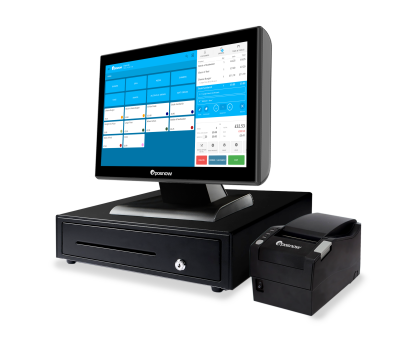5 Retail Supply Chain Management Best Practices and Tips
For many entrepreneurs, the supply chain isn’t taken into consideration until it has to be. The average person on the street may not even be aware of the millions of moving parts that work to get products they love in their hand.
Despite being a process most people don’t think about, supply chain management is an essential part of everyday life. For retail business owners, supply chain management is an integral part of their job description. After all, if your brick and mortar store doesn’t have any stock, you don’t have anything to sell.
Tackling the supply chain can seem like an insurmountable task. While it might be intimidating at first, there are a number of ways to handle it. In this blog, we’ll be examining what a supply chain is, what makes it essential, and will provide five helpful tips to help you better manage your supply chain.
What is the supply chain?
Simply put, a supply chain is the network of resources, suppliers, businesses, and middlemen that get goods and services into the hands of the consumer. Depending on the industry and the product, these networks can be globe-spanning and involve hundreds (if not thousands) of people and businesses.
In modern supply chains, suppliers are generally ranked on a tier system. In this system, first-tier suppliers supply directly to their clients, second-tier suppliers supply to the first-tier, and so on and so on. While in some boutique situations, the number of suppliers involved might indicate a higher quality product, this is not always the case.
Now that we understand what a supply chain is, we can define what we mean by supply chain management. In essence, supply chain management is exactly what it sounds like. It refers to the management of the supply brokers and the goods they provide.
Gain all the advantages of a POS system with detailed, flexible, downloadable reports, and so much more:
- Manage and update products quickly with easy to use software
- Expand your business into multiple channels and integrate with a variety of online platforms
- Manage multiple locations and salespoints with multi-site management
- Keep queues short with streamlined, modifiable sales processes
- Choose a setup that suits you with software and hardware options
Software Hardware

5 top supply chain management tips
When not handled correctly, supply chain management can be a logistical nightmare. A poor grasp of the supply chain makes the task of inventory management near impossible. Luckily, we have some tips to help.
Develop a winning supply strategy
In the case of supply chain management, planning and preparation are the keys to success. You should be aiming to make as few decisions during your stock renewals as possible. It’s impossible to foresee the future, but by establishing a solid plan, you can better prepare for any issues that may arise.
Once you have a plan in place, you should start thinking about contingencies in case the worst happens. This may mean lining up backup suppliers, ordering alternative products, or it could mean holding supply stock on certain products. Either way, by preparing contingencies, you’ll be setting up your business to storm any weather.
Embrace helpful technology
Modern supply chains are highly sophisticated networks, using some of the most cutting-edge technology available. Supply management software is available to large and smaller businesses alike. These pieces of software takes human error out of the equation and ensures you have what you need when you need it.
Operating an online retail supply chain has also been made much simpler thanks to advances in technology. For instance, many electronic point of sale systems include website builders that allow you to set your business up online quickly. Many consumers are turning to online sales and this allows you to sell to the whole market.
Implement automated orders
For many consumers, there is nothing worse than visiting a store or website to find the item they wanted out of stock. It’s a fact of retail that customer demand will sometimes outstrip supply. As a business owner, if you can keep on top of demand, you’ll improve your customer experience.
One way supply chain management can solve this issue is by enabling automatic orders. Many retail POS systems, such as the Epos Now Complete Solution, offer this feature. Using retail supply chain software, you can configure your system to automatically order new stock when your system registers that you’re running low. This means you can always provide disappointed customers with new stock, and will have the opportunity to retain the sale.
Analyze and optimize your analytics
It could be said that the management of supply chains is the management of numbers. If we take it down to its very basics, trade is simply an exchange of numbers on a spreadsheet. X is sold for Y, which in turn is sold for Z.
By understanding the numbers behind your business, you have a much easier time managing your supply chain. Unless you have a background in accountancy or a similar field, tracking your analytics manually can be very difficult.
Using automated analytics, Epos Now POS systems allow you to collate your data. This data is then automatically converted into easy-to-understand business reports. With these reports, you can get an in-depth understanding of how much your stock purchases are costing you compared to your profits. This, in turn, allows you to adjust your stock to maximize profit.
Learn from your mistakes
Depending on the size of your business, there can be hundreds of moving parts in your supply chain. You’re only human, and it’s perfectly reasonable to think that you’ll make the occasional mistake. While these mistakes can be expensive, they’re not the end of the world.
Instead of letting these mistakes overtake your business, use them as learning experiences. When a mistake happens, sit down and take some time to plot out the process and pinpoint what went wrong. Once you understand how the mistake happened, you’ll be able to avoid it in the future.
Simple and effective POS
Your supply chain is complicated, but your POS program doesn’t have to be. Epos Now systems have been built with ease of use in mind without sacrificing sophisticated software and reliable hardware.
If you’re interested in hearing how Epos Now could help your business, get in touch with our expert team below.



